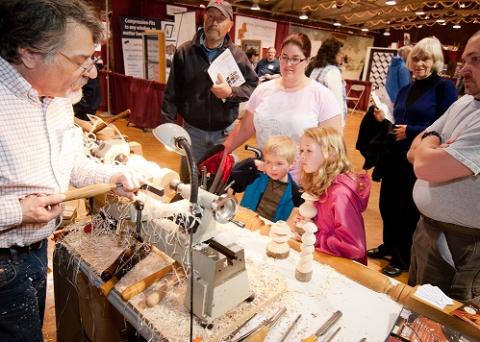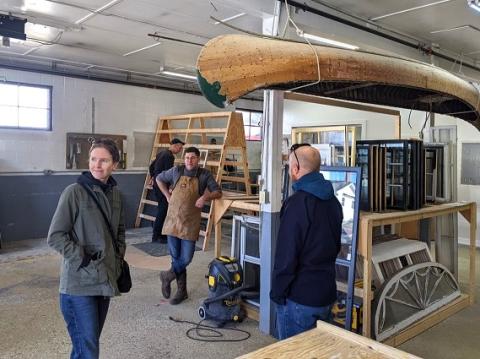Research from UNH Extension Offers Insights for Building the Northeast’s Preservation and Restoration Trades Workforce
In New Hampshire and beyond, a growing number of older homes and community landmarks are in dire need of maintenance and repair or rehabilitation. Historic structures often require tradespeople have specialized knowledge in preservation and restoration techniques and an in-depth understanding of how to work with traditional materials. In recent years, property owners and preservation-minded groups have noted significant shortages of tradespeople with these specialized skills, such as masons, plasterers, and carpenters. The lack of a preservation trades workforce can have serious impacts upon a variety of community well-being considerations, such as housing availability, quality of life, sense of place, and sustainability.
In early 2022, a team of Community and Economic Development Specialists from UNH Cooperative Extension were brought on board to work with the Northeast Regional Initiative for the Preservation Trades, a partnership between four statewide preservation nonprofits: the Preservation League of New York State, the Preservation Trust of Vermont, New Hampshire Preservation Alliance, and Maine Preservation. This UNH Extension team worked with the initiative’s partners to develop primary research questions regarding the status of the preservation trades workforce in this region and how it can be expanded and strengthened. The team devised a multiple-methods plan for research and engagement, including an online survey, interviews, focus groups, and online roundtable discussions. On March 28th, the UNH Extension team and their partners officially launched the full research report, coinciding with a free webinar, which attracted over 150 participants.

Photo courtesy of NH Preservation Alliance
Findings from this research confirm the workforce shortages that have long been anecdotally observed and indicate that such shortages are caused by a variety of factors. While the current workforce is aging and many are retiring, opportunities for youth to participate in “shop” classes during their schooling are diminishing. As a result, many young people lack the basic, foundational knowledge that could set them up to be interested and successful in these careers. Furthermore, students who do participate in trades education, such as through Career and Technical Education (CTE) programs, are often directed toward new construction careers without opportunity to learn about the restoration of older structures.
Promisingly, this research finds that preservation trades careers can be highly rewarding: 96% of tradespeople who responded to the workforce survey reported satisfaction in their careers, and interviews with these professionals suggest that they are increasingly able to “name their price” for their work due to high demand. However, partnerships and collaborations are needed to increase awareness of these career paths, introduce more young people to the trades, and break down some of the stigmas and societal pressures that have kept students from pursuing these paths in recent decades. There are positive signs that stigmas are subsiding and trades professions are becoming more welcoming to workers who have traditionally been underrepresented, such as women.
Preservation trades professionals note that a variety of educational pathways, including college education, trade schools, and apprenticeships, can lead to successful preservation trades careers. Many preservation tradespeople find their work particularly engaging due to its creative qualities and connections to academic disciplines like history, engineering, chemistry, and art. Across educational approaches, ample mentorship and access to hands-on, field-based learning experiences are critical elements of trainee development.
Some of the key findings include:
- Severe shortages in workforce were reported in plastering, masonry, carpentry, materials conservation, decorative finishes, windows, and iron work
- More than one-third of tradespeople survey respondents report a wait list of a year or more their services
- 93% of survey respondents agree that young people lack knowledge about career possibilities in preservation trades
- 75% of respondents believe the demand for preservation trades is growing
- 88% of respondents feel that training programs could play a greater role in recruitment and workforce development

Photo courtesy of NH Preservation Alliance
Next up, the partner organizations will work together and with their state’s variety of stakeholders to develop action plans for workforce development. Jennifer Goodman, Executive Director of N.H. Preservation Alliance, is looking forward to putting this research into action. "Tradespeople's reports of high job satisfaction, positive trends like the trades becoming more welcoming to women, and strong examples of existing informal and formal mentorships and trainings that could grow makes addressing this huge challenge feel more personal and do-able," said Goodman.
The full research report, “Understanding and Advancing the Preservation Trades,” provides an overview of the current status of these professions in the Northeast and offers a wealth of insights from tradespeople, educators, workforce development professionals, and preservation specialists. These perspectives together inform a variety of recommended actions suitable for individual practitioners, businesses, nonprofits, training programs, and other stakeholders who aim to strengthen the preservation trades workforce.
For inquiries regarding this research, please contact Jada Lindblom at jada.lindblom@unh.edu.
For more information about the Northeast Regional Initiative for the Preservation Trades, visit www.preservenys.org/preservation-trades.


